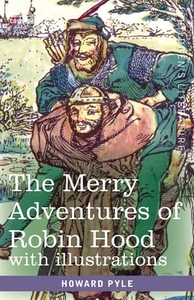Take a photo of a barcode or cover
I really enjoyed this book. It was a little hard to get into because of the Old English language, but after 20 pages or so I got into the groove of things and was able to read it much easier. It was a fun book. I was surprised that Maid Marian was really only mentioned in passing. I thought she would be a bigger character in the book. Makes me wonder where she came from, or if some movie producer just decided to embellish the character to add a love story to one of the movies.
Not unlike Disney’s Robin Hood movie, without the foxes. If Wikipedia is to be believed, this children’s book set the tone for future Robin Hood stories and was one of the first to portray him as an outlaw philanthropist. Who was the real Robin Hood? Who knows, but this was a fun listen.
Book published in 1883.
Book published in 1883.
adventurous
funny
lighthearted
relaxing
medium-paced
Plot or Character Driven:
A mix
Strong character development:
Yes
Loveable characters:
Yes
Diverse cast of characters:
Yes
I love Robin Hood, a fantastic story, with great language
Pretty good. Interesting reading something written with an older english style to it, BUT then I see the author was born in 1853 so perhaps it was more to the time of his writing it!
Fun and enjoyable.
Fun and enjoyable.
adventurous
challenging
funny
inspiring
slow-paced
Plot or Character Driven:
Character
Strong character development:
Yes
Loveable characters:
Yes
Diverse cast of characters:
No
Flaws of characters a main focus:
No
I was looking forward to reading this book. I really wanted to like it. But, alas, I can not say that I did.
First of all, Robin Hood is arrogant, rude, and utterly unlikeable. He insults people he just met, picks a fight, and then acts like he's the one who's been insulted. He is very quick to threaten others with violence, even when all they've done is tell him to leave them alone. He extorts from people he just met, and somehow he's the "good guy." The narrator and other characters keep telling us how good, noble, and gentle he is, yet his actions do not support any of that. Supposedly he robs from the rich to give to the poor, but we don't actually see much of the giving to the poor part.
The stories were also very boring and repetitive. Robin insults someone, they fight, now they're friends, and the new person joins the band of merry men. Over and over and over again. He enters an archery contest. Someone shoots the middle of the target, and Robin shoots an arrow through that arrow. The Sheriff must have prosopagnosia (face blindness), because every time Robin changes clothes the Sheriff can't recognize him. The same stories were repeated over and over again, and it got old fast.
Howard Pyle also knows absolutely nothing about combat. Sword fights did not go on for hours and hours. A duel lasted minutes, perhaps even less than a minute.
Finally, it must be said: this is not written in old English. This isn't a criticism of the book, but of many of the reviewers. Pyle has his characters use some old-fashioned expressions, but none of it is Old English. Old English is actually the ancestor of Modern English, and not just English that sounds old. Very few people can actually read Old English, because it is so different from Modern English as to be an entirely different language. Even Shakespeare is Early Modern English.
Okay, I'll get off my soapbox now.
Anyway, my 5th graders like it, so I guess it's a decent book for children.
First of all, Robin Hood is arrogant, rude, and utterly unlikeable. He insults people he just met, picks a fight, and then acts like he's the one who's been insulted. He is very quick to threaten others with violence, even when all they've done is tell him to leave them alone. He extorts from people he just met, and somehow he's the "good guy." The narrator and other characters keep telling us how good, noble, and gentle he is, yet his actions do not support any of that. Supposedly he robs from the rich to give to the poor, but we don't actually see much of the giving to the poor part.
The stories were also very boring and repetitive. Robin insults someone, they fight, now they're friends, and the new person joins the band of merry men. Over and over and over again. He enters an archery contest. Someone shoots the middle of the target, and Robin shoots an arrow through that arrow. The Sheriff must have prosopagnosia (face blindness), because every time Robin changes clothes the Sheriff can't recognize him. The same stories were repeated over and over again, and it got old fast.
Howard Pyle also knows absolutely nothing about combat. Sword fights did not go on for hours and hours. A duel lasted minutes, perhaps even less than a minute.
Finally, it must be said: this is not written in old English. This isn't a criticism of the book, but of many of the reviewers. Pyle has his characters use some old-fashioned expressions, but none of it is Old English. Old English is actually the ancestor of Modern English, and not just English that sounds old. Very few people can actually read Old English, because it is so different from Modern English as to be an entirely different language. Even Shakespeare is Early Modern English.
Okay, I'll get off my soapbox now.
Anyway, my 5th graders like it, so I guess it's a decent book for children.
Nothing wrong with this book. But my favorite part of Robin Hood was the whole stealing from the rich and giving to the poor. This book was very much focused on his manly gang and their manly activities. (I know it's a classic and I should've known that but I like to read books without reading reviews if I can manage it.)
All in all good for what it is but not my cup of tea. Plus the ending hurt my soul.
All in all good for what it is but not my cup of tea. Plus the ending hurt my soul.
This is the best compilation of classic Robin Hood tales I have ever come across. You cannot help but smile and laugh as you read about this legendary outlaw's exploits.
Is it idealized? Of course. Pyle was aiming at whimsy and nostalgia more than realism. The Merry Adventures of Robin Hood transports readers back to a happier, simpler time.
Is it idealized? Of course. Pyle was aiming at whimsy and nostalgia more than realism. The Merry Adventures of Robin Hood transports readers back to a happier, simpler time.
adventurous
lighthearted
medium-paced
Plot or Character Driven:
A mix
Strong character development:
No
Loveable characters:
Yes
Diverse cast of characters:
No
Flaws of characters a main focus:
Yes



